20231025 The Beech Trees are Dying
Published by Ronald Steed,
ACHE | LONGING | HOPE | OPEN-HEARTS | LOVE | JOY
The Beech Trees are Dying
St. Andrews Episcopal Church, Madison, CT ¹. Taken from Matthew 23:34-46 ²
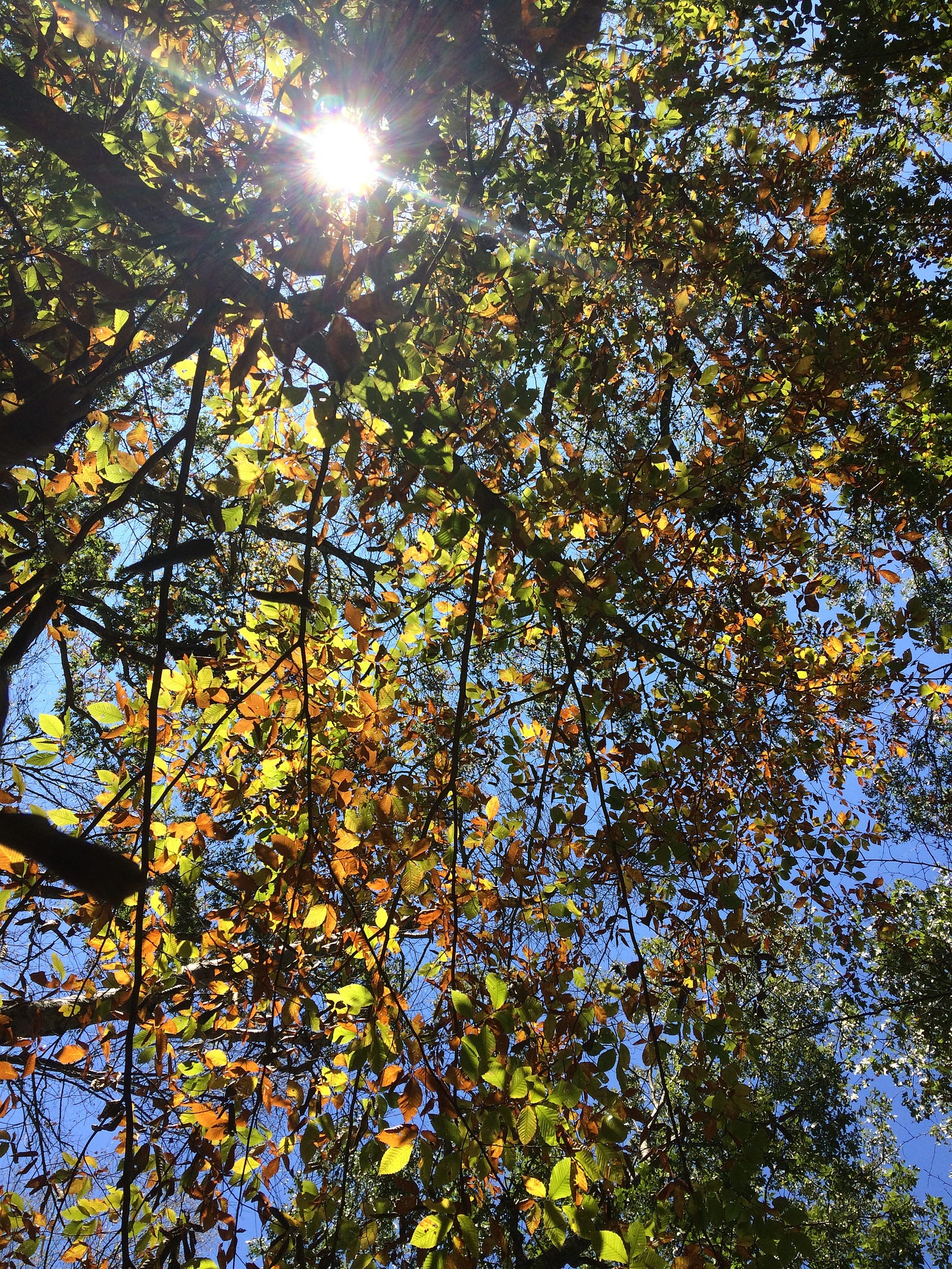
Beech trees overhead, looking a little thin in Fall | Photo by Ron Steed
The Beech trees are dying.
The Beech trees are dying, and that breaks my heart. All of them have a disease that causes their leaves to fall off. I first noticed it three years ago in the forest where I walk. While the oaks and the maples were leafing out, the beeches were bare or thinly leafed, and its been that way for three years running. This tree is a staple of the CT forest, and in 10 years, there won’t be any. And, it will affect all the magnificent Copper Beech trees that are so iconic, and some of my favorites.
What I feel about this is part what many people are now are calling The Ache³. The Ache, which seems to wash over many of us, comes from the cumulative weight of all the things that grieve us in COVID times. I feel it about the Israel/Gaza war, the Ukraine/Russia war, the strife in Sri Lanka and in 24 other conflicted places around the globe. I feel it about gun violence and the more-than-daily mass shootings across the U.S. like the one that just happened in Maine on Wednesday. I feel it about climate change, and political strife in the U.S. I feel it about homelessness, and I feel it from the patients I chaplain at the hospital. I feel The Ache in a lot of you.
The problems of early Jewish and Christian cultures were not seen through the same lens that we see and feel the problems of today. I think that is one reason why scriptures written for those times do not seem to strike a chord with many people today. The Ache is certainly there to be found, but it is often spoken about in other terms.
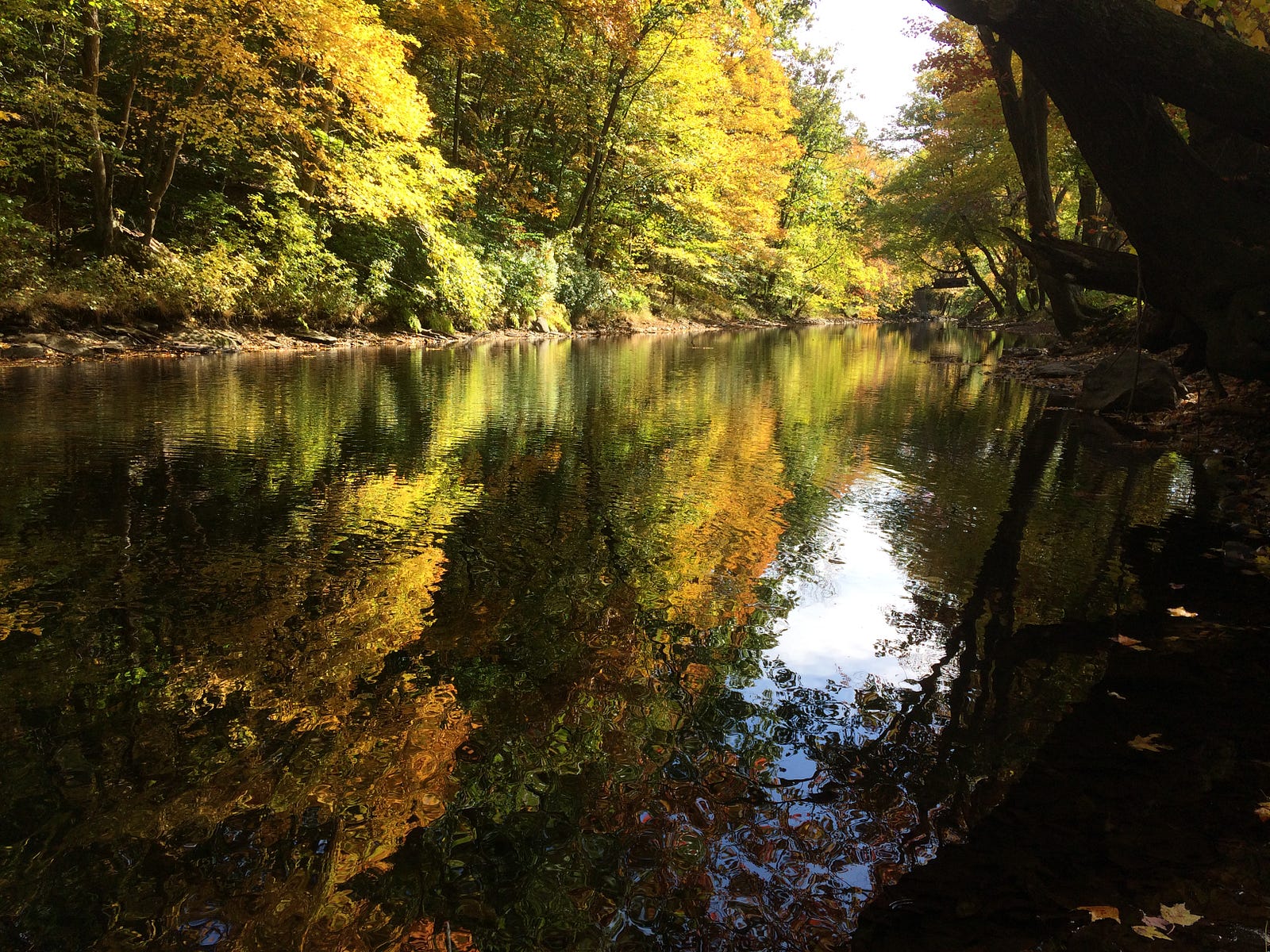
Yantic River in October | Photo by Ron Steed
For the Jews who were sent into exile in Babylon, the problem was idolatry; worshiping something other than God like Baal or Astarte… it’s the reason for their exile to Babylon as they saw it. For the Apostle Paul, the problem was sin and for centuries afterwards, guilt was the emotion Christians contended with. Hebrew and Christian testaments, seem focused on a DIFFERENT problem than the one we feel. We read the words, and they don’t seem to fit our experience.
It’s true, idolatry is still here today; many seem to worship guns and all kinds of other destructive things. And certainly, sin is still here today; we miss the mark in all kinds of ways. But idolatry and sin are judgements; moral condemnations about about action. They are fingers wagged in our face that say "You’re not good enough… you’re not doing it right!" And isn’t that also the whole capitalist idea? To tell us over and over that we’re not good enough, not rich enough, not fit enough, and then to sell us fulfillment-in-a-box to those who can afford it? The whole purpose of The Enlightenment was to propose an alternative and secular system to Christian judgyness, but it just seems to have substituted a new form of moral condemnation! There is a LOT of finger-wagging in American Culture, and maybe a big part of the The Ache is that it feels like we’re being judged all the time; because we are!
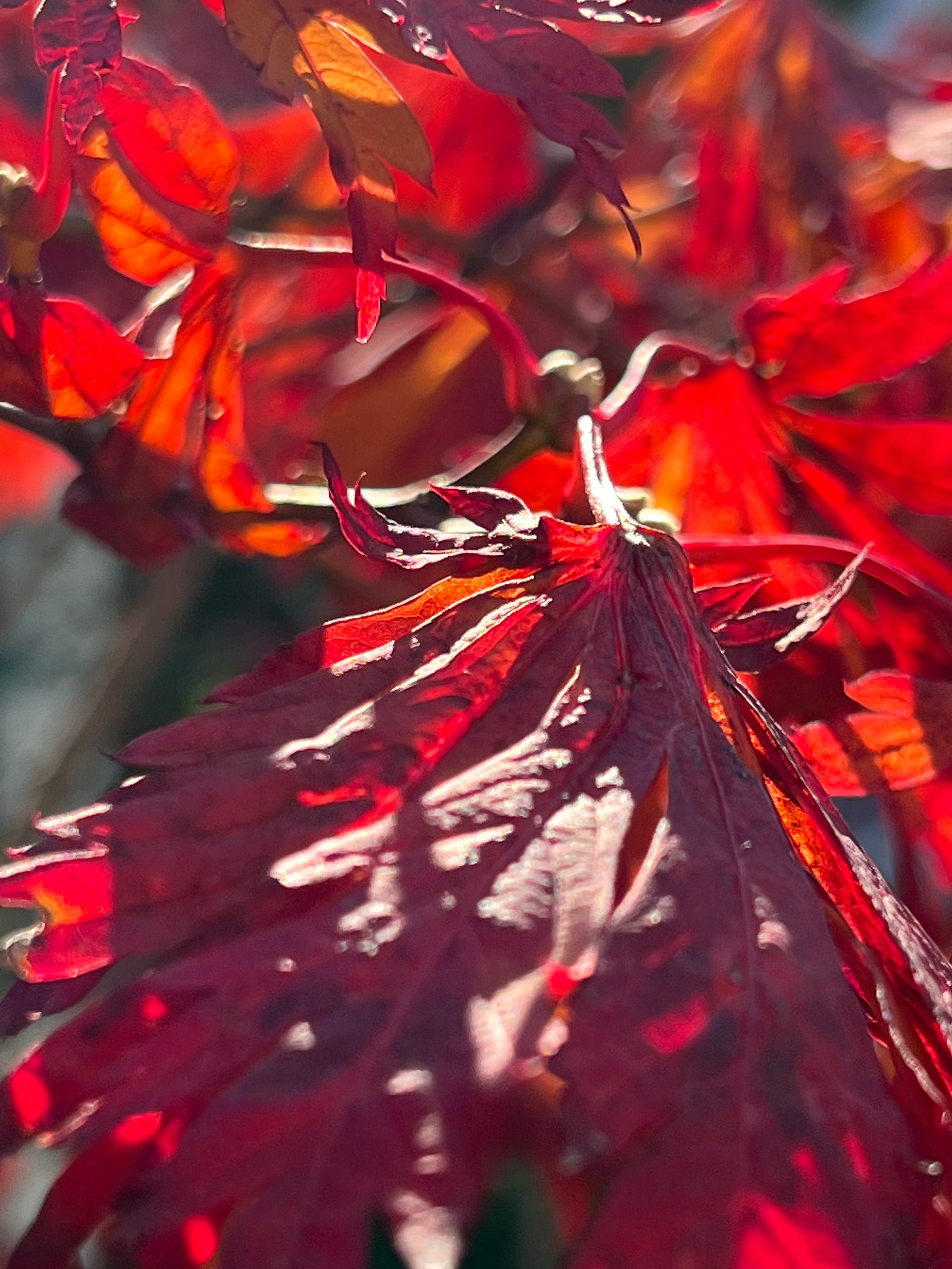
Maples on Fire | Photo by Ron Steed
The Ache is NOT a judgement; it’s an emotion that wraps itself around us like shroud; we feel it in our bones. We’re in a crises of meaning, and isolation, and loneliness, and neurosis.
Christianity has a powerful symbol for that ache. It comes at the very moment when Shariya cracks the wafer of bread and we hear its sharp report echo in this space. That cracked bread stands in, not just for Christ’s body, but for all the bodies broken in Israel, and Gaza, in Lewiston, Maine, in Madison, in your own homes… in all the woodlands of CT.
Here are some of the aches that I feel when that bread is broken… maybe you do too:
- I ache that every thing and every one is extracted, commodified, and transacted… that we seem to be not heard, not seen, and in constant conflict with one another;
- I ache that what is worthless seems highly prized by all; If you want to know what is NOT prized, just look at those parts of your day that are quiet because the world does not value them;
- I ache that for many, whole groups of people are regarded as inhuman and insignificant, and our lives seem meaningless and powerless;
- I ache that our therapeutic culture calls us to turn our minds inward to find our true selves and to be as authentic, full and productive, and self-fulfilled as possible, and instead we find ourselves neurotic, exhausted, and vulnerable to depression or addictions. "We experience life as shallow and insubstantial, fragile and precarious. We vacillate between boredom and anxiety." (Beck)
These are some of the aches I feel when the bread is cracked. I wonder what yours are.
And, the Christian story does not end with aches… it goes on to another emotion. What rises from The Ache is a LONGING for something else… something heartbreakingly beautiful… something the world does not seem to understand or to want.
Bishop Jeff said to a group of us recently; "Longing is everything". It turns out that scripture, both old and new has a lot to say about longings; we just have to tune into the right frequency to hear it through all the judgy chatter about idolatry and sin.
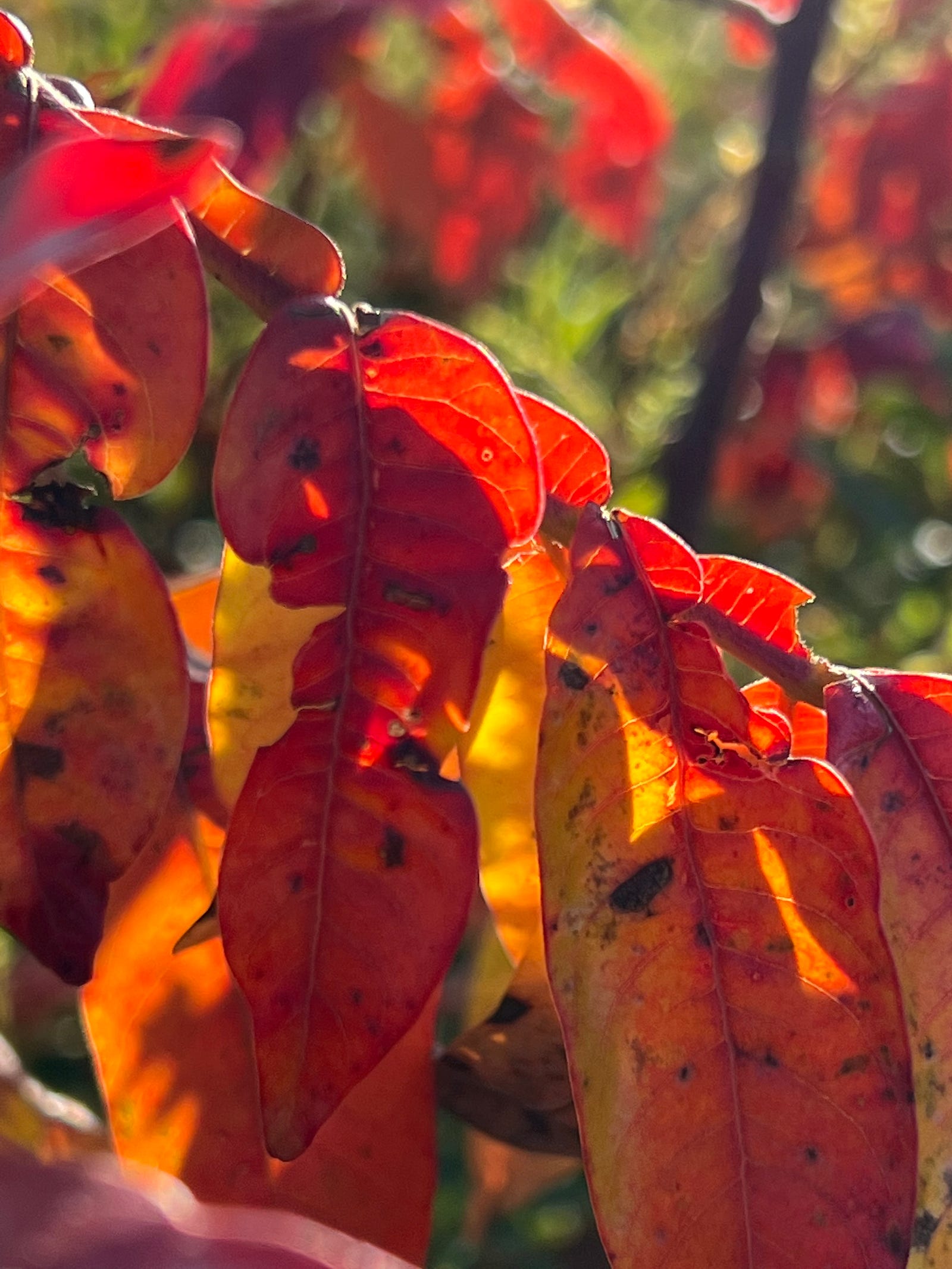
The fire of love | Photo by Ron Steed
Here are some of my longings;
- I long for God to be WITH me, and for the Spirit to enchant all creation and every human heart, connecting me to you with the fire of God’s Love. I LONG for that.
- I long for God to hallow and bless the people and the moments that break my heart, those that fill me with joy, and God’s good road that we walk on together; that God will help me to hallow and bless others in "our vocation to be a light to the world, and the salt of the Earth". (NT Wright).
- I long for God to reveal meaning and significance in life; in hardship, in suffering, and in my cross-shaped moments;
- I long for God to tune me into me heart, and turn my eyes outside myself toward a LOVE that is much bigger than me, a love that I can trust… toward the rock from which we were hewn, and toward the quarry from which we were dug; Jesus.
- I long to feel Love instead of Ache… THAT’S the emotion I want to feel. To love and to BE loved.
Christianity DOES have language, and symbols, and practices that help our Ache and our Longing; its language IS heartbreakingly beautiful, its symbols are powerful and rich with layers of meaning, and its practices can fill us with a THIRD emotion, if we let them.
In Christianity, that third emotion is called HOPE. And by hope, I don’t mean a far off day that is better than today. I mean, something I can see and feel NOW, in this MOMENT. The hope I have is a PRESENT hope, a second-by-second anticipation, an ATTENDING hope.
Here are a few of my attending hopes:
- I hope that I might wake up to moments of mystical awareness, and witness the enchantedness of creation and its people; to see the "unfolding newness of each moment of creation" (Samuel Wells);
- I hope that we might be drawn together in beloved communities;
- I hope that we might have the peace which the world cannot give;
- I hope that I might find Jesus each day and find myself in Jesus;
- I hope that I might become more and more like Jesus… more fully human each day, and less and less like how my ego wants the world to see me;
- I hope that I might see and know that things which were cast down are being raised up, and things which had grown old are being made new, and that all things are being brought to their WHOLENESS and perfection by the one through whom all things were made, Jesus Christ.
Those are some of my hopes; I hope them for you too.
Christianity tells us that there is one sure and certain way of fulfilling that hope, and that is to open our hearts daily… moment by moment. The heart is the instrument of connection between us… it is the knowing center, the resonating chamber of God.
And I know only one way to open my heart to these hopes. And that is to PRACTICE what Jesus proclaims in today’s Gospel: to love the Lord my God with all my heart, and with all my soul, and with all my mind, and to love my neighbor as myself. The cure for our aches, the fulfillment of our longings and hopes, and the bandage for our broken hearts is just one thing; Love. It is in those moments when I open my heart and project that love to God and to you, that I find my hopes fulfilled… I am not disappointed. I DO encounter God’s mystical presence, I see God’s hand at work in the world, I feel love instead of ache and longing. I feel joy. I hope you will too.
So; ache, longing, hope, open-hearts, love, joy. THIS is the emotional path we walk in modern Christianity.
And we might pled with God about this "Can’t we just bypass The Ache?" Can’t we have these OTHER emotions, like hope and love and joy without having so much heartache? Can’t I just get a better therapist, take a new prescription drug, or read a self-help book?
No, I’m sorry. This is the VERY thing that Christianity KNOWS that secular capitalism will never understand.
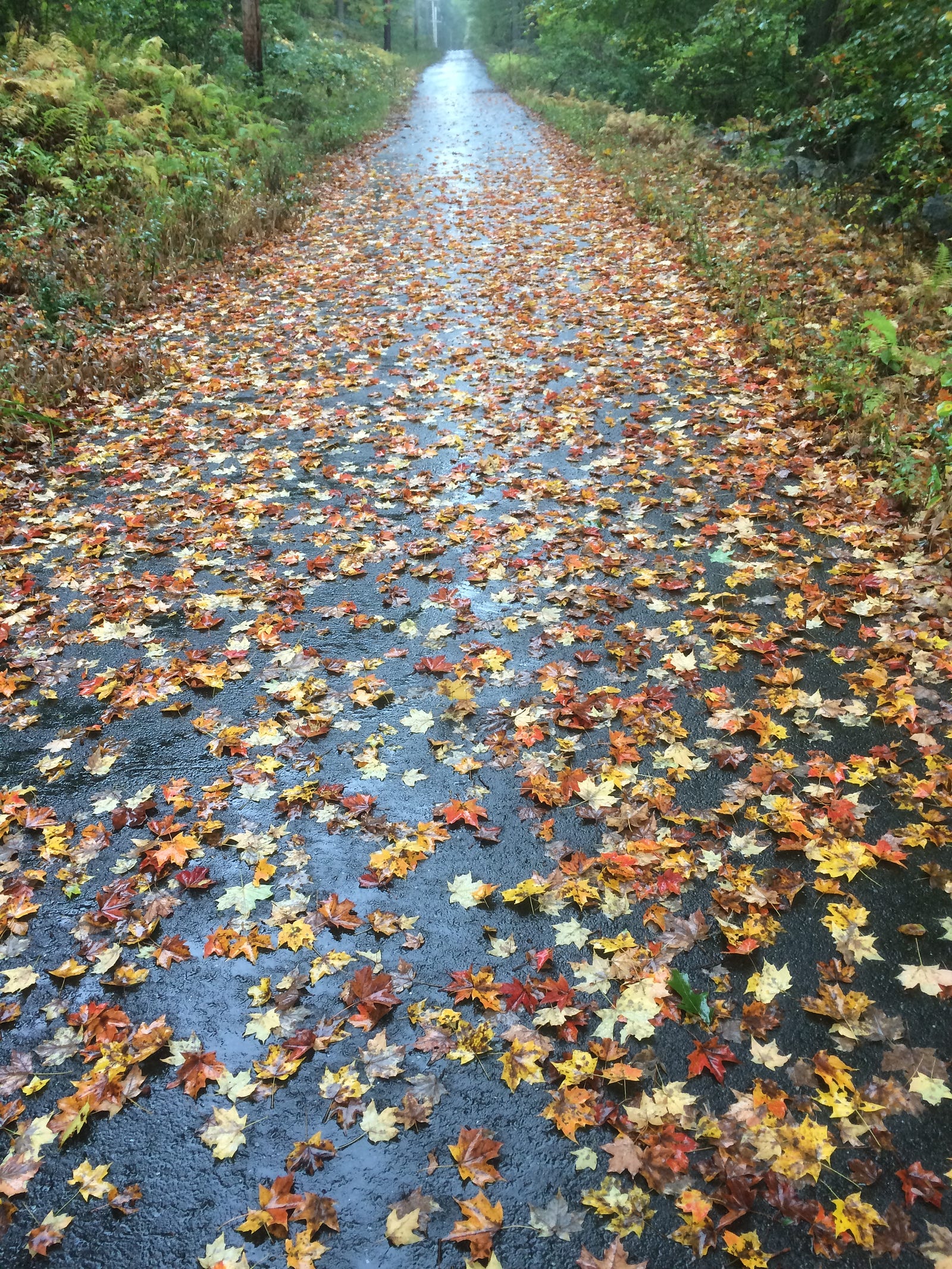
God’s good road passes though our aches and longings… | Photo by Ron Steed
There’s only one path on God’s good road to hope and love and joy and it passes though our aches and longings, through the very things that grieve us. That’s why, as soon as the bread is broken, Shariya says "Alleluia", as though to proclaim how counterintuitively wonderful it is, that in the brokenness of the world, right at the throbbing CENTER of our ache, we encounter Christ. There is no resurrection without the cross; there is no joy without weeping over beech trees.
So, be a little ridiculous and go lay hands on a beech tree, and catalogue your aches… stand there and share your longings with that tree. Don’t run away from those emotions… let them wash over you… let the tears well up and spill over. And then, open your heart by projecting love to God and to that living creature. And before you know it; you’ll be right as rain.
¹ This sermon was delivered at St. Andrews Episcopal Church, Madison, CT, in ordinary time, proper 25, October 29, 2023
² Matthew 22:34–46 (NRSV):
When the Pharisees heard that Jesus had silenced the Sadducees, they gathered together, and one of them, a lawyer, asked him a question to test him. "Teacher, which commandment in the law is the greatest?" He said to him, "‘You shall love the Lord your God with all your heart, and with all your soul, and with all your mind.’ This is the greatest and first commandment. And a second is like it: ‘You shall love your neighbor as yourself.’ On these two commandments hang all the law and the prophets." Now while the Pharisees were gathered together, Jesus asked them this question: "What do you think of the Messiah? Whose son is he?" They said to him, "The son of David." He said to them, "How is it then that David by the Spirit calls him Lord, saying, ‘The Lord said to my Lord, "Sit at my right hand, until I put your enemies under your feet" ’? If David thus calls him Lord, how can he be his son?" No one was able to give him an answer, nor from that day did anyone dare to ask him any more questions.
³ Many of the themes of this sermon are drawn from:
BECK, R. (2023). Hunting Magic Eels: Recovering an Enchanted Faith in a Skeptical Age. BROADLEAF BOOKS.
The Rev. Ron Steed is an Episcopal Deacon in Southeast Connecticut and has served the New London Homeless Hospitality Center in a variety of ways. He writes haiku and lyrical prose that he hopes will help others put the head and heart in right-relation.
Top writer in: Art, Watercolor, Haiku, Sermons, Refresh the Soul Weekly, and Episcopal Church.

Ron Steed